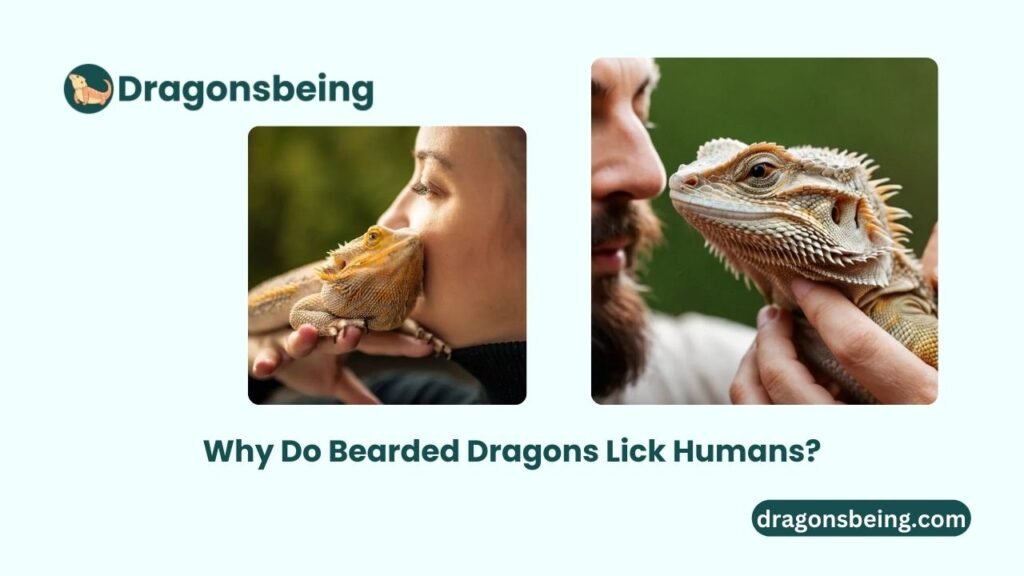Bearded dragons lick humans primarily to gather information through taste and smell. This behavior also indicates curiosity and comfort with their surroundings.
Bearded dragons are fascinating pets known for their unique behaviors. One of these intriguing actions is licking, which can puzzle many owners. Understanding why they lick humans can enhance your bond with these reptiles. Bearded dragons use their tongues to explore their environment, much like how dogs sniff to learn about their surroundings.
This behavior reveals their curiosity and helps them assess their comfort level. Observing your bearded dragon’s licking can provide insights into its mood and health. By recognizing this behavior, you can ensure a more enriching experience for both you and your pet.
Introduction To Bearded Dragon Behavior
Bearded dragons often lick humans. This behavior is more than just a quirky habit. Licking serves as a way for them to explore their environment. Understanding this behavior can enhance your bond with your pet.
Using Taste To Understand Surroundings
Bearded dragons have a unique way of learning. They use their sense of taste to gather information. Here are some key points about their licking behavior:
- Flehmen response: Licking helps them detect scents.
- Curiosity: They explore new objects through taste.
- Safety: Licking can help them identify safe spaces.
This behavior is instinctual. It mimics how they interact with their natural habitat. Through licking, they gain knowledge about their surroundings.
How Licking Aids In Environmental Perception
Licking plays a crucial role in a bearded dragon’s life. It helps them navigate and understand their world. Here’s how licking enhances their perception:
| Aspect | Benefit |
|---|---|
| Identification of food | Recognizes edible items |
| Detection of danger | Identifies potential threats |
| Understanding habitat | Adapts to new environments |
By licking, bearded dragons assess their surroundings. This behavior shows their adaptability. It also reflects their natural instincts.
Understanding this behavior can improve your interactions. It reveals their curiosity and desire for exploration.
Decoding Licking: A Sign Of Exploration
Bearded dragons often lick humans. This behavior raises questions about their intentions. Are they simply curious? Or do they show affection? Understanding this behavior helps strengthen the bond between you and your pet.
Bonding With Bearded Dragons
Building a strong bond with your bearded dragon is essential. Licking can be a sign of trust. Here are some reasons why your bearded dragon might lick you:
- Familiarity: They lick to learn about you.
- Comfort: Licking shows they feel safe around you.
- Exploration: Bearded dragons use their tongues to explore.
Regular interaction helps strengthen this bond. Spend time with your pet daily. Offer treats and gentle handling. This encourages positive behavior.
Is It Love Or Simple Curiosity?
Understanding the motives behind licking is key. Bearded dragons may lick for various reasons:
| Reason | Description |
|---|---|
| Curiosity | They explore their environment using their tongue. |
| Affection | They may express love through licking. |
| Hunger | They might taste you to check for food. |
Observe your bearded dragon’s body language. Happy and relaxed pets often lick more. Pay attention to their behavior during interactions.
In summary, licking can be a mix of curiosity and affection. Each bearded dragon is unique. Understanding their individual behavior helps deepen your connection.
Licking Humans: Curiosity Or Affection?
Bearded dragons have a unique way of exploring their world. They often lick humans and objects around them. This behavior is linked to their Jacobson’s organ. This special organ helps them sense their environment better.
The Role Of The Vomeronasal System In Licking
The vomeronasal system is vital for bearded dragons. It helps them detect various scents and chemicals. Here are key points about this system:
- Located in the roof of their mouth.
- Helps in identifying food and predators.
- Plays a role in social interactions.
When a bearded dragon licks, it collects chemical information. This process allows them to understand their surroundings. They can identify scents from humans and other animals.
Chemical Communication In Reptiles
Chemical communication is essential for reptiles. Bearded dragons use licking for various reasons:
- To find mates.
- To mark territory.
- To sense potential threats.
Through licking, they gather important chemical signals. This helps them respond appropriately in their environment. Understanding this behavior enhances our bond with these fascinating creatures.
Sensory Functions: The Jacobson’s Organ
Bearded dragons use licking to communicate. This behavior helps them establish their territory. They recognize their human caretakers and differentiate between familiar and unfamiliar people.
Marking Their Human Caretakers
Bearded dragons lick their human caretakers for several reasons:
- Familiarity: Licking shows comfort and bonding.
- Territory: They mark their humans as part of their space.
- Identification: Unique scent helps them recognize you.
When a bearded dragon licks, it leaves its scent. This behavior reinforces their connection with you. It’s their way of saying, “You belong to me.”
Identifying Familiar Vs. Unfamiliar People
Bearded dragons are cautious creatures. They can tell familiar from unfamiliar people. This is how they do it:
- Scent Recognition:</strong
Territorial Marking And Recognition
Bearded dragons can be curious creatures. They often lick humans. This behavior raises health and hygiene concerns. Understanding these risks is crucial for both pet owners and their pets.
Understanding Zoonotic Risks
Zoonotic diseases can transfer between animals and humans. Bearded dragons may carry bacteria and parasites. Here are some key points about zoonotic risks:
- Salmonella: A common bacteria in reptiles. It can cause serious gastrointestinal illness in humans.
- Parasites: Bearded dragons may host worms or mites. These can infect humans if not managed properly.
- Transmission: Licking may spread germs. Proper hygiene helps reduce these risks.
Keeping Both Pet And Owner Healthy
Maintaining health for both pet and owner is essential. Here are some tips:
- Wash hands: Always wash hands after handling your bearded dragon.
- Regular vet check-ups: Take your pet for routine check-ups.
- Clean habitat: Keep the enclosure clean and sanitized.
- Avoid contact: Limit licking and close contact when possible.
Staying informed helps keep everyone safe. Understanding the risks and practicing good hygiene makes a difference.
Health And Hygiene Concerns
Bearded dragons communicate through various signals. Licking is one of these signals. Understanding why they lick humans helps owners respond correctly. Stress can lead to unwanted behaviors in these reptiles. Recognizing stress signals is crucial for their well-being.
Distinguishing Between Licking And Stress-related Behaviors
Licking can mean different things. It might indicate curiosity or stress. Here are some behaviors to watch for:
- Licking: Shows interest or exploration.
- Head bobbing: A sign of dominance or irritation.
- Tail curling: Indicates discomfort or fear.
- Hiding: Suggests the dragon feels threatened.
Observe your bearded dragon closely. Look for changes in behavior. Stress signals often appear with other signs. Understanding these can help keep your pet happy.
Creating A Stress-free Environment For Your Pet
A calm habitat can reduce stress. Here are some tips to create a peaceful home:
- Provide a proper enclosure size.
- Maintain appropriate temperatures.
- Include hiding spots and climbing areas.
- Limit loud noises and sudden movements.
- Ensure regular feeding and hydration.
Monitor your dragon’s body language. A relaxed dragon will bask and explore. A stress-free environment promotes healthy behavior.
Bearded Dragons And Stress Signals
Understanding why bearded dragons lick humans involves exploring humidity and hydration. These factors are vital for their health. Bearded dragons often lick to regulate moisture levels. This behavior helps them stay hydrated in a dry environment.
Licking As A Way To Stay Hydrated
Bearded dragons lick surfaces for moisture. This is crucial for their survival. They may lick your skin for the following reasons:
- Moisture absorption: They can absorb water through their skin.
- Salinity detection: Licking helps them detect salt content.
- Temperature regulation: Wet surfaces can help them cool down.
Hydration is essential for proper bodily functions. A dehydrated bearded dragon may show signs of stress. Regular licking can signal their need for moisture.
Humidity Levels And The Health Of Bearded Dragons
Humidity affects bearded dragon health significantly. Ideal humidity levels range from 30% to 40%. Too low or too high humidity can cause problems.
| Humidity Level | Effects on Health |
|---|---|
| Low (<30%) | Dehydration, shedding issues, and stress. |
| Ideal (30-40%) | Healthy hydration and proper shedding. |
| High (>40%) | Risk of respiratory infections and mold growth. |
Monitor humidity in their habitat. Use a hygrometer to measure it accurately. Adjust humidity using misting or water bowls. Proper humidity supports their overall well-being.
The Role Of Humidity And Hydration
Understanding how to interact with your bearded dragon is key. Proper handling builds trust and ensures safety for both you and your pet. Follow these guidelines for a positive experience.
Best Practices For Handling Your Bearded Dragon
- Always wash your hands before and after handling.
- Support their body fully. Use both hands.
- Hold them close to your body for security.
- Limit handling time to 15-30 minutes to reduce stress.
- Stay calm and gentle. Avoid sudden movements.
Tips For Safe And Enjoyable Interactions
Engaging with your bearded dragon can be fun. Use these tips to enhance your interactions:
- Let your dragon come to you. This builds confidence.
- Use treats like leafy greens or insects to bond.
- Pay attention to their body language. Respect their mood.
- Keep the environment quiet. Avoid loud noises.
- Introduce new surroundings slowly. Give them time to adjust.
By following these handling and interaction guidelines, you ensure a happy, healthy relationship with your bearded dragon.
Handling And Interaction Guidelines
Understanding why bearded dragons lick humans is important. This behavior reveals much about their feelings. Let’s explore how to interpret these licks. We will also discuss ways to strengthen your bond with your pet.
Interpreting Your Pet’s Behavior
Bearded dragons lick for various reasons. Here are some common interpretations:
- Curiosity: Licking helps them explore their environment.
- Communication: They may be signaling their needs or feelings.
- Affection: Licking can show trust and comfort with you.
- Hunger: They might be searching for food or treats.
Observe your dragon’s body language. Signs of comfort include:
| Behavior | Meaning |
|---|---|
| Relaxed posture | Feeling safe and secure |
| Eyes half-closed | Calm and content |
| Head bobbing | Showing interest |
Fostering A Strong Bond With Your Bearded Dragon
Building a strong connection with your bearded dragon is crucial. Here are some effective methods:
- Regular handling: Spend time holding your dragon gently.
- Provide a safe space: Ensure their habitat is comfortable.
- Feed them treats: Offer healthy snacks they love.
- Talk softly: Use a calm voice to soothe them.
- Observe their preferences: Notice what makes them happy.
Creating a trusting environment encourages more licks. This can lead to a stronger bond between you and your bearded dragon.
Frequently Asked Questions
Why Do Bearded Dragons Lick Their Owners?
Bearded dragons lick humans to gather information about their environment and recognize their owners.
Is Licking A Sign Of Affection In Bearded Dragons?
Licking can indicate curiosity and comfort, but it’s not always a direct sign of affection.
How Often Do Bearded Dragons Lick?
Licking frequency varies; some may lick daily while others do it occasionally.
What Does It Mean If A Bearded Dragon Licks Me?
It often means your bearded dragon is exploring or trying to familiarize itself with you.
Can Licking Indicate Stress In Bearded Dragons?
Yes, excessive licking may signal stress or discomfort in a bearded dragon.
Should I Be Concerned About My Bearded Dragon Licking?
Occasional licking is normal, but monitor behavior for signs of stress or health issues.
Conclusion
Bearded dragons lick humans for various reasons, including curiosity and communication. Understanding this behavior deepens the bond between you and your pet. It’s a natural way for them to explore their environment. Embracing this quirky habit can enhance your experience as a reptile owner, making interactions more enjoyable and meaningful.

Hi, I’m Dr. Michelle Mayers, a veterinary professional with a deep passion for animal health and well-being. Over the years, I’ve dedicated my life to caring for animals and helping pet owners better understand their furry, feathered, or scaly companions. On my blog, Dragonsbeing, I share insights, tips, and stories that aim to educate, inspire, and connect with fellow animal lovers. Join me at Dragonsbeing as we explore the fascinating world of veterinary care and celebrate the special bond between humans and animals!


